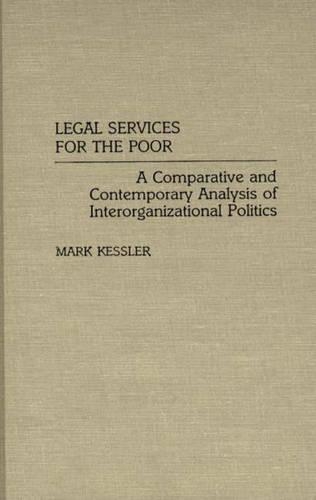
Legal Services for the Poor: A Comparative and Contemporary Analysis of Interorganizational Politics
(Hardback)
Publishing Details
Legal Services for the Poor: A Comparative and Contemporary Analysis of Interorganizational Politics
By (Author) Mark Kessler
Bloomsbury Publishing PLC
Praeger Publishers Inc
21st May 1987
United States
Classifications
Tertiary Education
Non Fiction
Poverty and precarity
362.58
Physical Properties
Hardback
200
Description
Nearly 200 interviews with legal services lawyers and administrators, bar association officers, judges, and political officials form the basis for this book on the delivery of civil legal services to the poor. Beginning with a brief history of legal assistance programs, Kessler examines the operation of five local programs funded by the national Legal Services Corporation. The activities of poverty lawyers in urban, rural, and suburban settings are described and analyzed and the author offers an explanation for variables in service based on the constraints imposed by the interorganizational environment. The implications of his findings are examined from the perspective of existing theories of organizational behavior, the system's potential for effecting political and legal reform, and current political debates surrounding the future of the Legal Services Corporation.
Reviews
. . . Mark Kessler, a political scientist, has presented a comprehensive empirical study of the structure of legal services practice. . . . The book is useful both for students of legal history and social movements and for those who study the structure of organizations. . .-Law & Society Review
An interesting and revealing study of five legal services programs (two rural, one suburban, two in large central cities) in a single unnamed state, based on 184 interviews conducted in 1980. Kessler explores why some programs pursue law reform activities while others restrict themselves to servicing individual clients. Although poverty lawyers tend to be quite liberal, varying local organizational contexts affect their legal strategies. Two fine chapters examine the suburban and central city programs in detail; each provides a gold mine of quotes about the relative freedom to pursue legal reform. In the central city, poverty lawyers can attempt law reform because effective community groups support them, but suburban poverty lawyers avoid law reform because the shared conservative views of the local bench, bar, and politicians discourage boat rocking. Ironically, the national Legal Services Corporation has had little impact on any of the local agencies. Kessler concludes that a pluralistic organizational environment is necessary for legal services to engage in law reform activities. The book ... should interest scholars of welfare and organizational theory, and upper-division and graduate students.-Choice
." . . Mark Kessler, a political scientist, has presented a comprehensive empirical study of the structure of legal services practice. . . . The book is useful both for students of legal history and social movements and for those who study the structure of organizations. . ."-Law & Society Review
"An interesting and revealing study of five legal services programs (two rural, one suburban, two in large central cities) in a single unnamed state, based on 184 interviews conducted in 1980. Kessler explores why some programs pursue law reform activities while others restrict themselves to servicing individual clients. Although poverty lawyers tend to be quite liberal, varying local organizational contexts affect their legal strategies. Two fine chapters examine the suburban and central city programs in detail; each provides a gold mine of quotes about the relative freedom to pursue legal reform. In the central city, poverty lawyers can attempt law reform because effective community groups support them, but suburban poverty lawyers avoid law reform because the shared conservative views of the local bench, bar, and politicians discourage boat rocking. Ironically, the national Legal Services Corporation has had little impact on any of the local agencies. Kessler concludes that a pluralistic organizational environment is necessary for legal services to engage in law reform activities. The book ... should interest scholars of welfare and organizational theory, and upper-division and graduate students."-Choice
Author Bio
MARK KESSLER is Assistant Professor of Political Science at Bates College in Lewiston, Maine.
